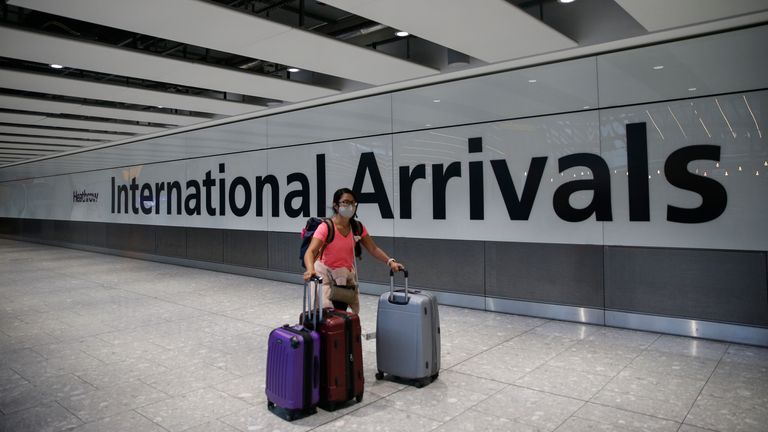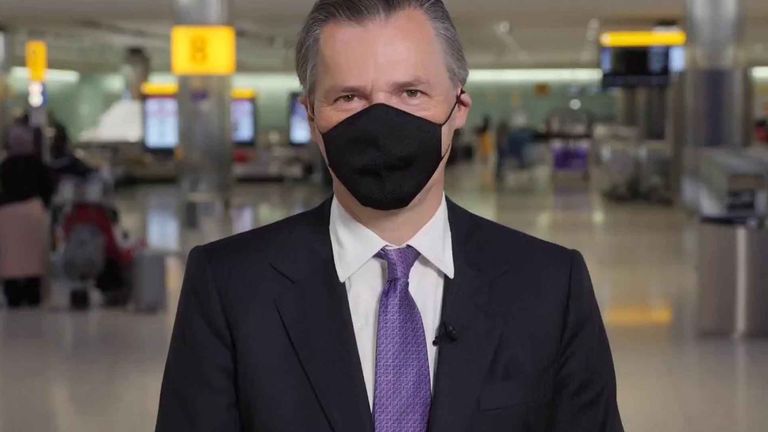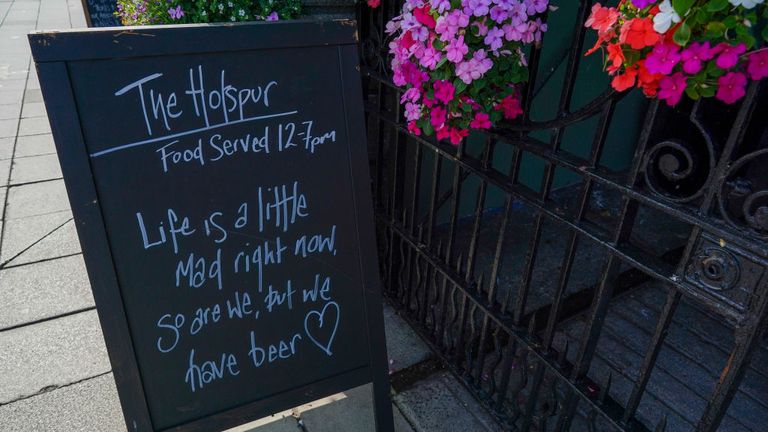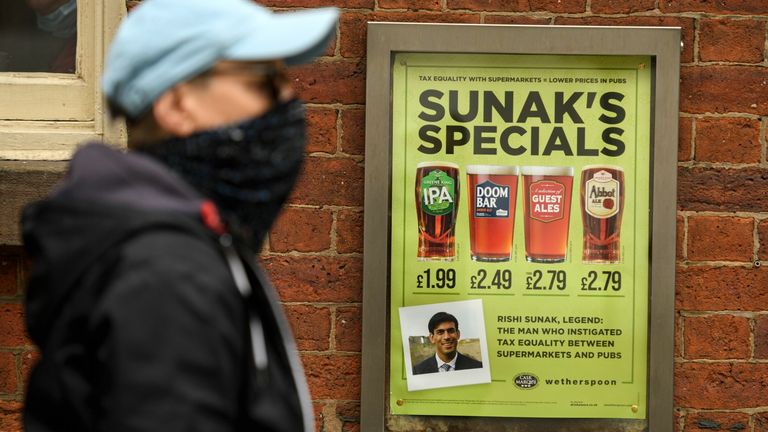It is possible to detect growing dismay and anger among business leaders at how Boris Johnson’s government is handling the pandemic.
Some have been consistently critical of the government throughout the crisis, particularly those in aviation, which has been battered by the lockdown and subsequent imposition of quarantine rules on travellers returning to Britain.
Watch and follow live on Sky News as Boris Johnson gives a Downing Street broadcast at 8pm
Willie Walsh, the former chief executive of IAG – the parent company of British Airways and Aer Lingus – told Sky News in June that the quarantine rules were “irrational and disproportionate”, adding that they had “torpedoed” hopes of getting people flying again in the summer.
More recently, Michael O’Leary, the chief executive of Ryanair, has stepped up his criticism of the government, describing its handling of the crisis as “lamentable”.
He told Sky News earlier this month: “Our customers are struggling to make any bookings with confidence when you have, for example, the British government locking down Bolton one day, Preston another day, inventing this new restriction that social settings will be reduced to six people.
“The government are just making this stuff up as they go along to cover up the fact that test and trace is effectively non-existent.
“I wouldn’t take any advice from [Boris Johnson].”
John Holland-Kaye, the comparatively mild-mannered chief executive of Heathrow Airport, has also stepped up his criticism in recent weeks.
He said this month: “We are putting this country’s future at risk.
“We weren’t born as one of the world’s great trading nations.
“We got there through hard work and ingenuity over decades.
“And all that work will be lost if we stand by and do nothing to safely open up our borders.”
But the despair in the aviation sector is now matched by industry leaders elsewhere following today’s announcements from the government.
The central criticism of ministers is not only their failure to implement an effective test and trace programme but also the insistence on restricting movement when most businesses have invested heavily in protecting employees and customers in line with government guidance.
Michael Gove, the Cabinet office minister, caused alarm this morning when he said people should work from home where they can – just weeks after the prime minister said that people should “go back to work now if you can”.
Jasmine Whitbread, chief executive of London First, the organisation that campaigns to make the capital an attractive business destination, said: “While public health must be the priority, discouraging people from returning to COVID-secure workplaces risks derailing an already fragile recovery.
“The new restrictions must be regularly reviewed to minimise the damage to the economy while safeguarding the health of the nation in the round – not just physical health, but mental health and our economic health.
“The government needs to move from rhetoric to delivery over test and trace, sharpen the clarity and consistency of its messaging and provide urgent support to affected businesses.
“Extending business rates relief and a targeted version of the furlough scheme would help those hardest hit in leisure, retail and hospitality.”
Adam Marshall, director-general of the British Chambers of Commerce, spoke for many on Monday when he urged ministers to “get a grip”.
He added: “A truly comprehensive test and trace programme is essential if the UK is to manage the virus without further lockdowns which will cripple businesses.
“Continuing delays and a shortage of tests saps business, staff and consumer confidence at a fragile moment for the economy.”
Nowhere is the unhappiness greater than in the leisure and hospitality sector, where this morning Whitbread – the owner of the Premier Inn hotel chain and the Beefeater and Brewer’s Fayre pub restaurant chains – announced up to 6,000 job cuts.
JD Wetherspoon, the pub group, also said today that up to 450 jobs in its pubs at Gatwick, Heathrow, Stansted, Birmingham, Edinburgh and Glasgow airports were at risk.
Speaking to Sky News, Tim Martin, the pub chain’s founder and chairman, tore into the government, arguing that its introduction of a 10pm closing time lacked proportion.
He said: “It is utterly stupid because what you have got at the moment is 3.2 million hospitality workers trying their very best to enforce social distancing rules.
“People will obey them if they think they are in their best interests.
“What they are doing is making those people redundant at 10pm and turning everyone out into the streets.
“What are 19, 20, 21-year-olds going to do – go home to mum?
“We’ve done a good job at social distancing in pubs.”
Mr Martin said that, following the success last month of the government’s Eat Out to Help Out scheme, contradictory signals were being sent out by ministers.
He added: “The whole thing is nuts. I’m fairly certain the government hasn’t got a clue what it’s doing…these jokers are ruining the country.
“At the moment, he [the Prime Minister]’s definitely not up to the job.”
Mr Martin’s comments are likely to be greeted with concern in 10 Downing Street because, during the general election campaign last December, he welcomed Mr Johnson to a Wetherspoon pub and happily posed for photographs with him.
Simon Emeny, chief executive of the pub and hotel operator Fuller’s, said he thought that the pub sector was being unfairly singled out in a “completely unjust” manner.
He added: “Pubs can actually be part of the solution – they are not part of the problem.
“It is a heavily regulated industry and we have successfully worked with the government across the entire sector to put protocols in place to ensure that everyone is safe in pubs.”
Mr Emeny said that, during four days since a 10pm closing time was imposed in the north east of England, sales at his group had halved.
He added: “I’m not really interested in lost sales at the moment, I’m more concerned with lost jobs, lost livelihoods, the morale and the mental health of my team.
“These are all things that are far more important to me than lost sales.
“I think this will be devastating for the industry but it will be devastating for so many people, who’re going to be cut adrift.
“Predominantly people who are under 30 who are going to lose their jobs as a result of, I’ll repeat what Tim said, some completely incoherent and inconsistent government strategies to deal with this virus.”
Some people may be tempted to dismiss the warnings from business leaders.
Chief executives, after all, are paid to promote the best interests of the companies they lead.
But it is exceptionally rare for business leaders to be quite so outspoken in criticising ministers.
They prefer to lobby behind the scenes rather than go public with their concerns.
Meanwhile, the financial markets – never a bad place to look, if you are seeking an objective judgement – are also delivering their verdict.
:: Subscribe to the Daily podcast on Apple Podcasts, Google Podcasts, Spotify, Spreaker
On the foreign exchange markets, the pound – already under pressure following Mr Johnson’s threat to break international law over Brexit – has fallen amid anxiety over what the further restrictions on social life will mean for the UK economy, while bets are being placed on further drops in sterling.
The equity markets have also spoken.
The FTSE 100 has underperformed nearly all of its peers in continental Europe this year, including the DAX in Germany, the CAC 40 in France and the MIB in Italy.
That may partly reflect the heavy weighting of the oil majors BP and Royal Dutch Shell in the index, not to mention unease over Brexit, but it is worth noting that the midcap FTSE 250, which has more of a UK focus, has fallen by even more than the Footsie this year.
That these new measures may be in place well into next year will do little to lift the sense of gloom.
Business people, on the whole, are overwhelmingly upbeat and optimistic.
They will need every ounce of this optimism to steer their businesses – and their employees – through this corrosive, confidence-sapping period.






